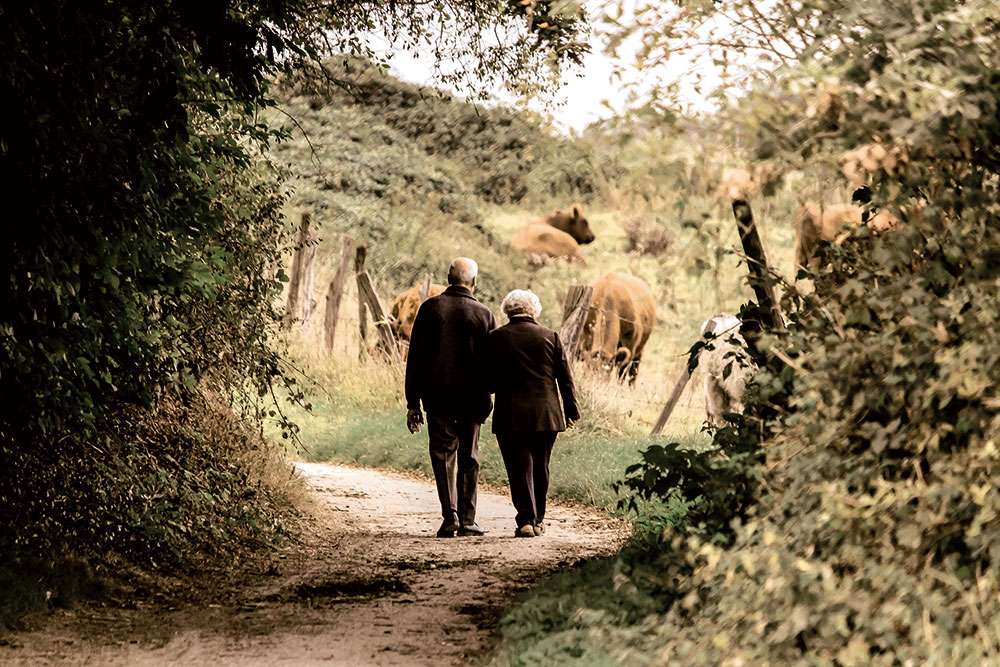
Most people live well into old age, however many live with long term conditions as we live longer. Longevity of course is to be celebrated. For those who live with arthritis, stroke, Parkinson’s or dementia, it is particularly important to continue flourish and feel in control. This means to be able to engage and participate fully in life with vitality for as long as possible. Often though, people can find themselves facing barriers such as feeling isolated, coming out of hospital and losing confidence, or a sudden change in circumstances. It does not take much to tip the scales of our ‘wellbeing status quo’.
A compassionate community means having a conscious awareness throughout Cranleigh of how we can listen intelligently and engage from the heart. This ensures a vulnerable person feels valued, competent & included.
We also know loneliness eats away and causes frailty, dependency, dementia, cancer and more. The drudgery of infirmity and loneliness are not just the bugbear of old age, it can be the root cause of depression, frequent illness, loss of agility, mental decline and rising care costs. In our communities we need to be prepared and create self-sustaining interaction and communication between small groups of all ages who have some of these challenges and help people get out and about confidently so that they can stay in the mainstream and continue to be active.
Joining up:
This requires joining up better what is already happening across Cranleigh and villages, creating a dynamic community calendar so people can make better choices, with better collaboration better between community groups. These things together can help prevent or slow down deterioration and help people stay connected in the community, benefiting all ages. It is about getting access to the right coordinated advice and getting support when you need it. With the integration of the NHS with Social Care, low-level community support must form the third leg of the stool for people to stay well in their neighbourhoods. Joining up the individual cogs better is the only sustainable way forwards. The state is shrinking; this means we must do things differently.
Change agents
Effective engagement with the community closes the barrier of ‘immunity to change’ that seeks to keep hold of the ‘status quo’. Change-makers with resilience and emotional stamina are needed – people who are persistent and flexible, working with ‘willing others’ and act then act on the opportunities to help that they spot!
This is not just motherhood and apple pie. Interesting lessons have been learnt from an eminent Social Entrepreneur, Andrew (Lord) Mawson, a former vicar and business man rolled into one. He started with a can-do attitude working in an underused church building with a few old ladies, to create the first Health Living Centre in the UK. His experience was an inspiration as it liberated people to think and act in ways that put them back in control, devolving power to the wider community, shaped by individuals, families and neighbourhoods. We too can work together and use our many assets and the strengths of people who can both give and receive support. Quick fixes don’t work. People need to be involved in the process of change and learning what works. We will always have the cynical with us with a limited world view, those who see the glass as half empty. But there are more who believe they can make a difference and there are better ways of doing things if we join up and work together across the community.
Real change needs strategy, it takes time and needs proper co-ordination. How about if we joined things up better in Cranleigh, employed a village agent/co-ordinator role supporting this? Then better community connections can really make a bigger impact rather than work in silos. This would be a new role working across health, care and the community and help keep people together, working with services and others, linking people and addressing community and individual needs in a holistic way, thus helping people stay well.
Key benefits include:
- Reducing loneliness and isolation- enabling people to take up social opportunities and access the information or signpost support they need to live well.
- Preventing hospital admission or assist in the early discharge of patients
- Preventing duplication and encouraging joint working to meet changing needs
- Improving the take up of existing services
- Supporting current voluntary initiatives and encourage new initiatives
- Acting as a catalyst to help increase volunteer numbers and capacity within the surrounding villages
- Providing a community wide strategy linking together voluntary, business, spiritual leaders, local government and care teams working closer together
- Maximising take-up of community activities for those who would most benefit
- Accumulating information and advice for residents and carers, and provision of information in a published form and website links
- Support initiatives such as befriending schemes
Being reminded of people’s efforts- seeking to come together, developing new conversations and connections is key to change to relationships and the community.
Recommendations include:
Smart Cranleigh CIC is a village initiative focused on promoting good quality of life for local people through enabling local organisations to work together more effectively. We aim to support community led projects that make a positive difference to the lives of local people. We aim to help local people connect with their community and empower them to find the local support they want.
Contact: Rosemary Hurtley 01483 272052 Or Stephen Dennison 01483 275810 for more information www.smartcranleigh.org











